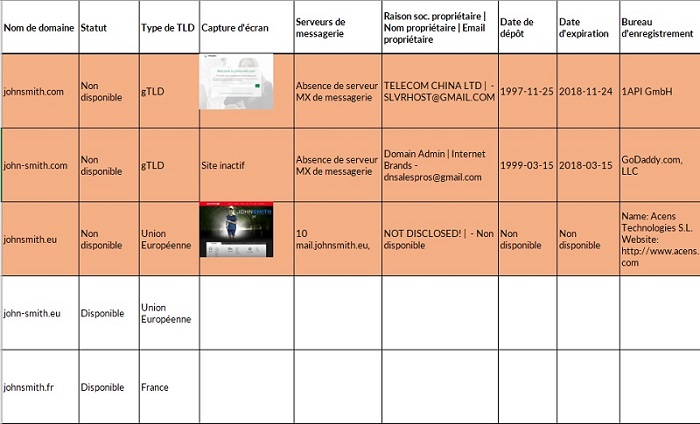Trademark clearance search
Before registering a trademark, you need to carry out a prior art search among registered trademarks and domain names.
When choosing a brand name, check that the brand is available.
Identical anteriority search
There is a first level of identical search. First, you check that there are no names identical to the one you’ve chosen for your trademark in a field of activity or for products and services identical or similar to your own.
Firstly, free tools can be used to carry out an identical prior art search.
TheINPI (Institut National de la Propriété Industrielle) website enables you to search French trademarks, Community trademarks and international trademarks protected in France.
Similarly, the TMview database enables free prior art searches of registered trademarks from the national offices of the European Union. It also covers trademarks from theEuropean Union Intellectual Property Office (EUIPO). In addition, TMview’s prior art searches are also available from numerous international partner offices outside the European Union.

As long as there are no insurmountable difficulties (such as an identical trademark used for identical goods and services), you can continue your availability search.
Search for similarities
Solidnames recommends that you carry out your trademark clearance search with an intellectual property professional.
Solidnames’ clients include some of the world’s leading patent attorneys and trademark attorneys. Through the intermediary of these experts in intellectual property law, the prior art search will determine whether your trademark is available without infringing the rights of third parties.
The industrial property attorney performs a advanced legal analysis of trademark search results. Do the property rights relate to the same goods and services? Is the trademark owner really using it for his business?
Specialized attorneys or CPIs prefer a similarity search. In this case, the search identifies visual, spelling, phonetic and intellectual similarities between your unregistered trademark and trademarks already protected. The trademarks detected may create confusion in the public mind.
Priority searches are not limited to registered trademark databases. It must be extended to other prior rights, such as company names, trade names, etc. This availability search is carried out globally in the databases of the Trade and Companies Register.
Domain name availability search
Generally speaking, a prior domain name used for goods or services identical or similar to those covered by a trademark application creates an anteriority that can be used against a subsequent trademark.
Case law holds that a trademark registered subsequently to a domain name used for the same products and services is effectively invalid.
Under current circumstances, a domain name constitutes a prior right, and a trademark cannot adopt this sign.
Solidnames offers two trademark searches among domain names.
How much does a domain name prior art search cost?
A strictly identical search in a defined and limited number of Internet extensions is the ideal way to start. Identical domain name prior art searches cost just €1 (excl. VAT) per domain name queried.
If your one-word trademark is audited in six Internet extensions, the fee would be €6 excluding VAT.
Under these conditions, an identical trademark prior art search in the popular .COM, .NET, .ORG, .INFO, .EU and .FR extensions costs €6 excluding VAT.
The deliverable for the prior art search is an Excel and Word document.
It includes the following information:
- . domain name
- internet extension ;
- status: available or already submitted ;
- DNS servers and email servers
- information available on the domain name holder from the post-RGPD “whois”.
- domain name registration and expiry dates
- registrar

The second prior art search offered by Solidnames covers all Internet extensions. Whatever the Internet suffix (generic, country or new extensions) in which the domain name is registered, the search will identify it.
It is also possible to carry out prior art searches among NFT domain names via a dedicated service. These searches concern blockchain domains such as .ETH or Unstoppable Domains (e.g. .888, .BITCOIN, .DAO…).
The settings for this availability search are not limited to identical writing. It should be emphasized that the similarity search also detects domain names containing the envisaged trademark.
It should not be forgotten that this prior art search also detects domain names registered with typosquatting or homoglyphs.
Rates for this service vary according to the number of results detected, and are quoted on request.
This domain name availability search by similarity is sold for €1 (excl. VAT) per registered domain name.
Protect your brand by monitoring it
This broad search is important. Although there may not be any names identical to yours, names close to the one chosen for your trademark may constitute prior art. As a result, you may become an unwitting infringer of someone else’s prior rights.
Remember that most intellectual property offices (such as INPI in France) do not carry out prior art searches when applying to register a trademark. Consequently, an infringing trademark can technically still be registered.
In such cases, the owner of a prior right can file an opposition to the trademark registration. This is done by subscribing to a trademark watch subscription.
In conclusion, remember that just because a domain name is registered before your trademark, doesn’t mean you can’t get it back.
A domain name that has already been taken can be listed for sale by its holder. That’s why you can mandate Solidnames to buy back a domain name that has already been registered, free of charge.
In addition to your .COM and .FR domain names, it’s ideal to own your own brand name in the product and service classes of your business.
To preserve your operating monopoly, consider subscribing to a monitoring service to take action against domain name cybersquatting. A malicious third party may register a domain name using your trademark to sell counterfeit goods, or a competitor may take unfair competition action.